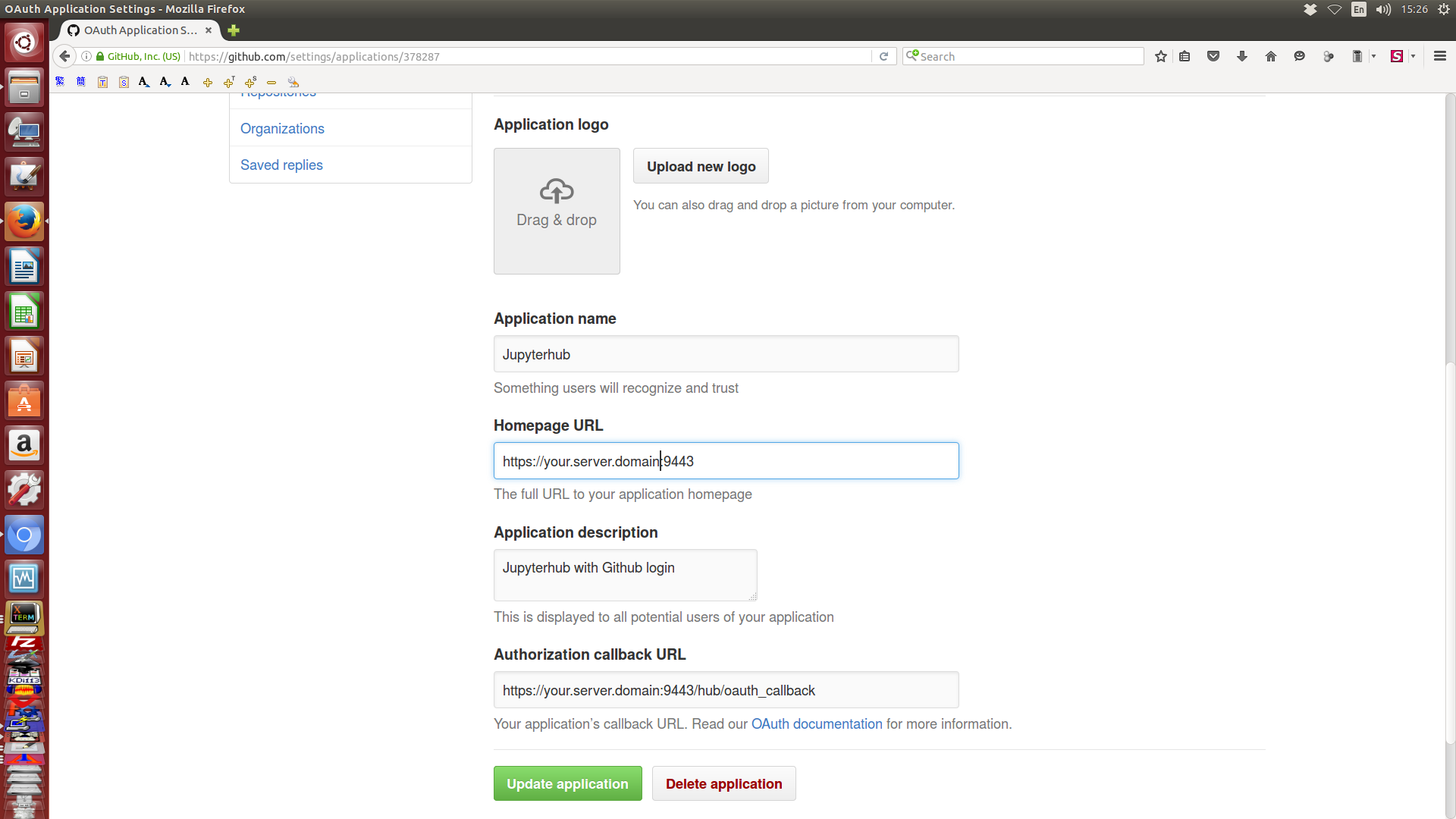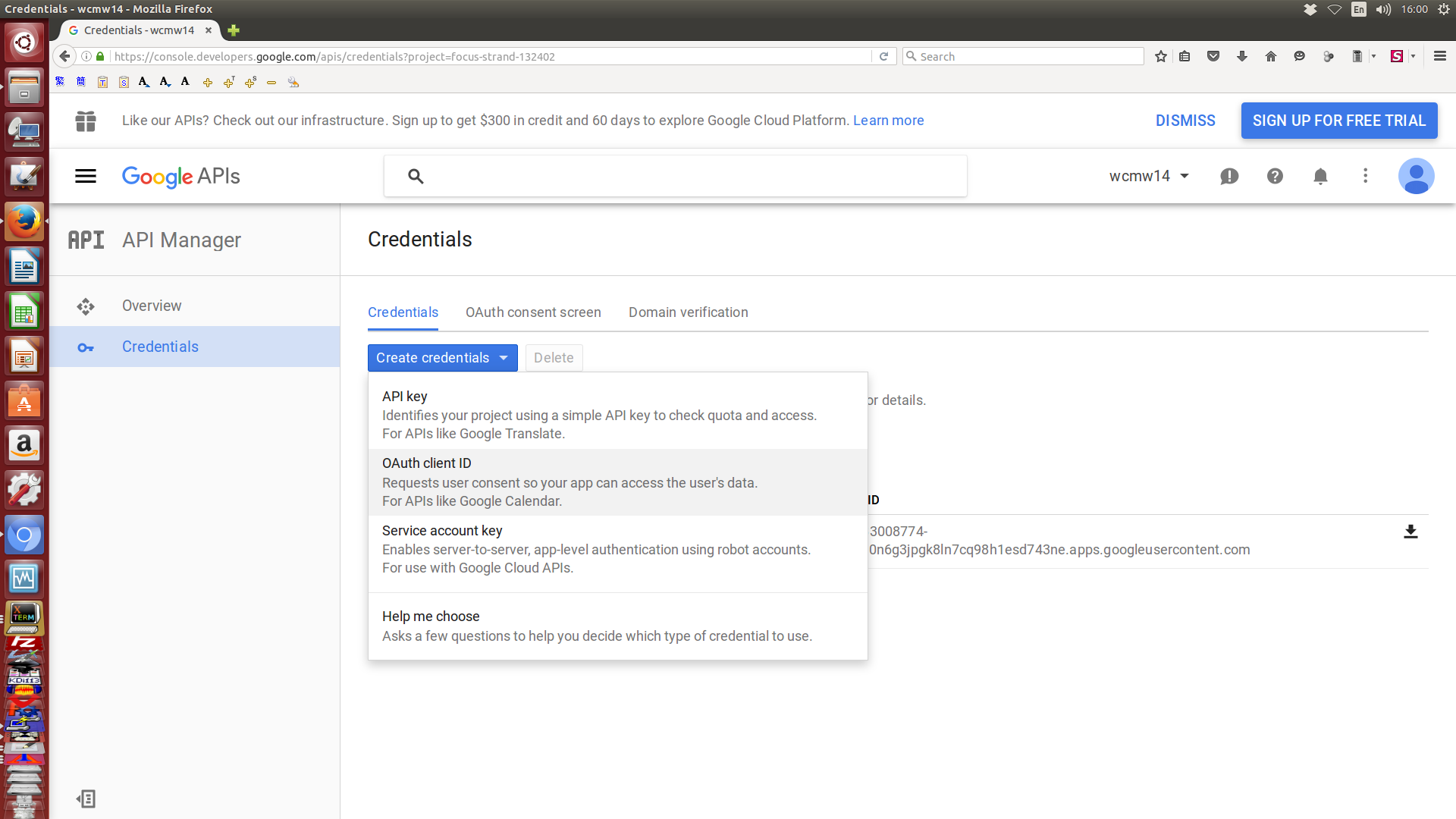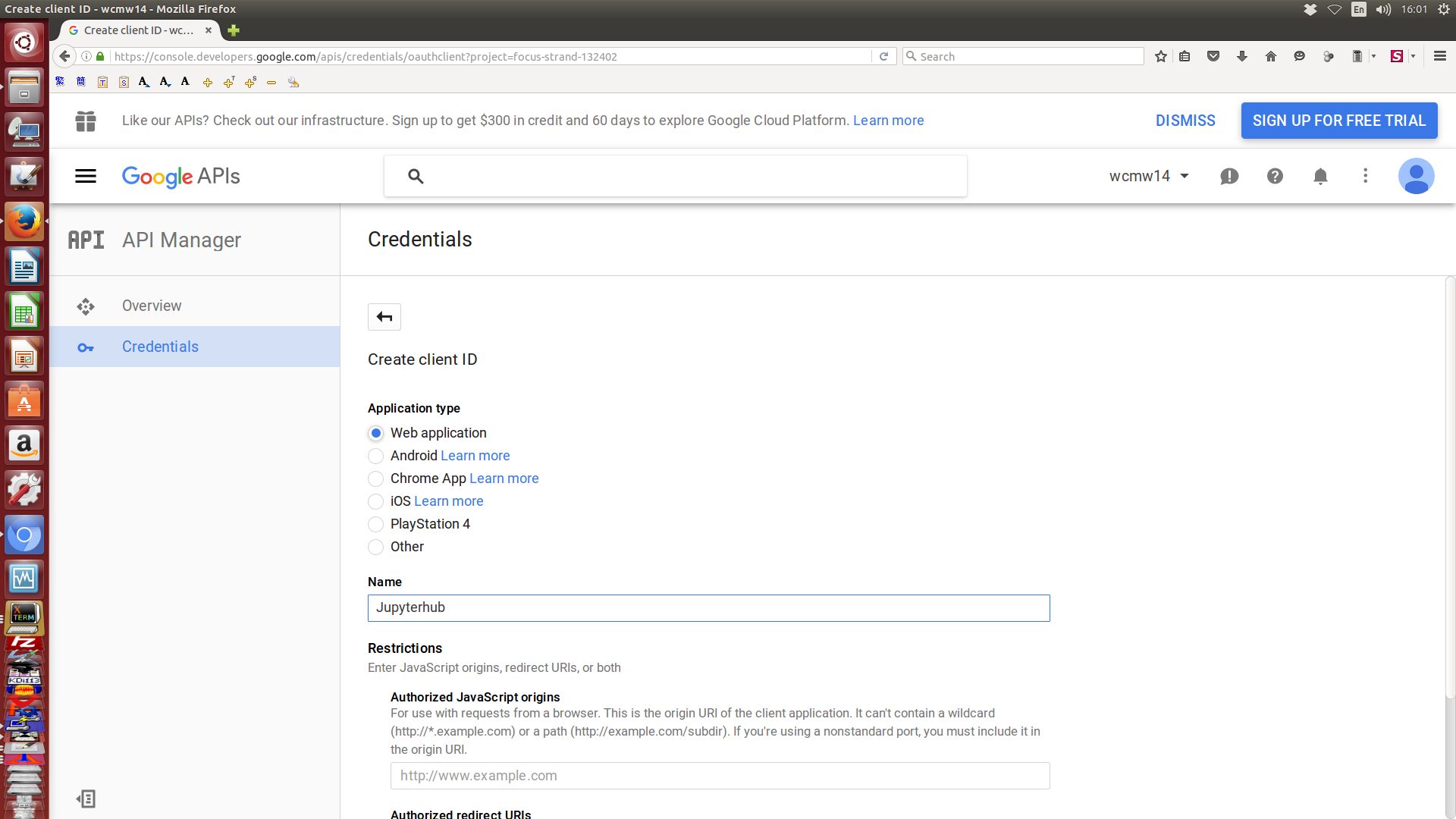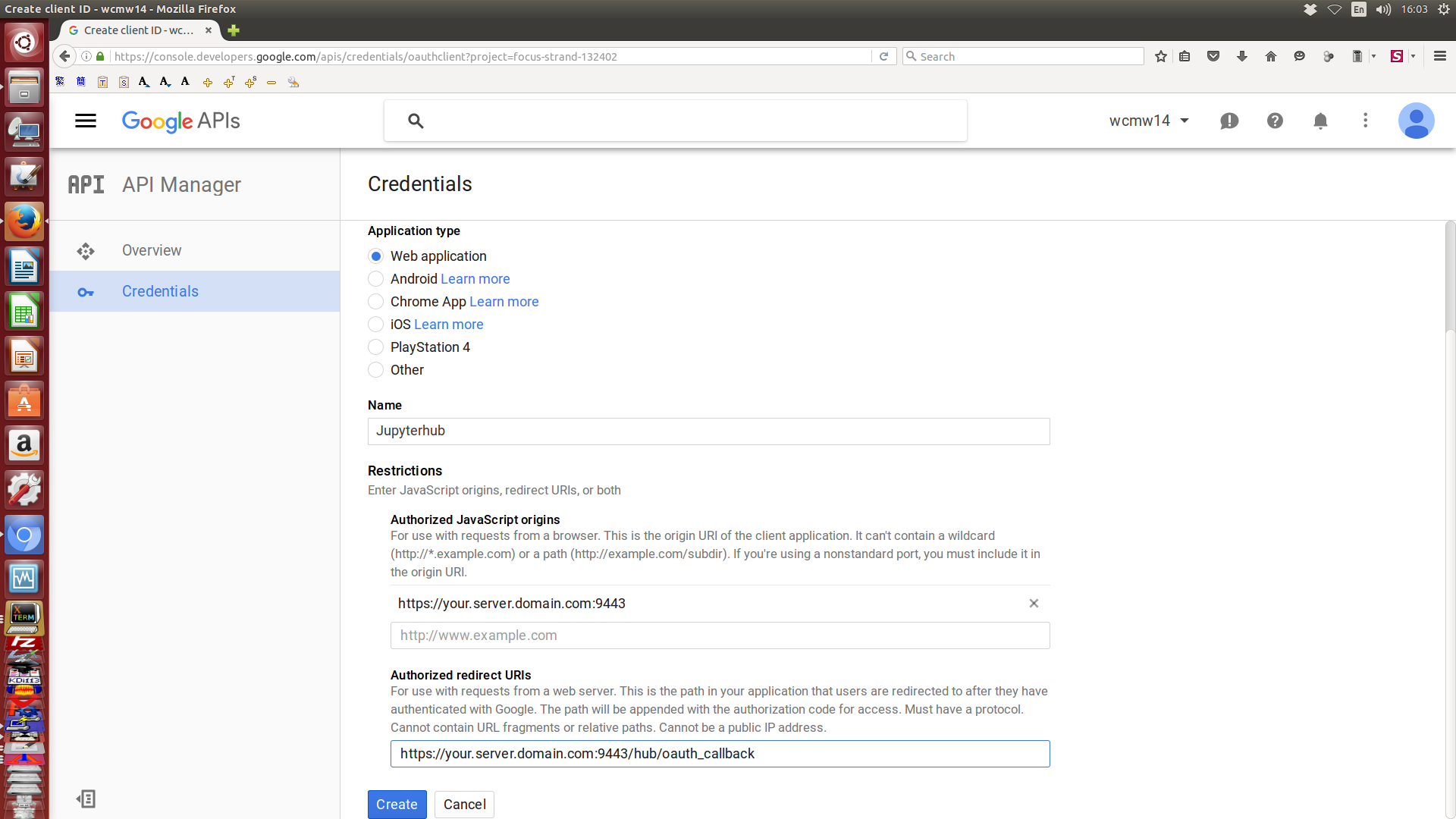當機械設計工程師精熟了 Matlab 與 Mathematica 之後, 若想更進一步了解這些數值運算工具的整體架構, 可以試著在實體機或虛擬機器 (或 Docker 容器) 上架設自由開源的 Jupyterhub, 好按照各自研發團隊的需求, 打造永續的設計運算生態系統.
http://jupyter.org/ 是一套支援超過 40 種程式語言的開源互動式資料運算平台, 而 Jupyterhub 則是一套提供多人使用 Jupyter 的網際數值運算伺服器.
這裡要介紹的是如何利用 Github 或 Google 帳號登入到團隊間所架設的 Jupyterhub 主機.
Jupyterhub 安裝
如 http://cadlab.mde.tw/post/chun-ipv6-huan-jing-xia-an-zhuang-jupyterhub.html 中的說明, 可以利用下列指令安裝 Jupyter:
sudo apt-get install npm nodejs-legacy sudo apt-get install python3-pip sudo pip3 install jupyterhub sudo pip3 install notebook sudo openssl req -x509 -nodes -days 365 -newkey rsa:2048 -keyout jupyterhub.key -out jupyterhub.crt
完成後, 就可以利用 jupyterhub --port 9443 --ssl-key jupyterhub.key --ssl-cert jupyterhub.crt 啟動, 然後以瀏覽器連接後 , 用伺服器機器系統帳號登入, 此時啟動的 Jupyterhub 完全採用內建的設定啟用.
設定 Github 與 Google 帳號
接下來要按照 https://github.com/jupyterhub/oauthenticator 中的說明, 利用 Github 與 Google 帳號, 分別註冊 https://github.com/settings/applications/new 與 https://console.developers.google.com 的網際應用程式開發設定, 主要的操作, 在根據 https://github.com/jupyterhub/oauthenticator 程式模組的設計, 從 Jupyterhub 登入時, 分別跳轉到 Github 或 Google 的登入流程, 待使用者完成登入並同意取用基本的帳號資料後, 即轉回 Jupyterhub 的回呼函式, 然後再按照 Jupyterhub 的啟動設定, 將使用者導向特定的 Jupyterhub 中的筆記本工作環境.
安裝 oauthenticator
第 1 步要先安裝 oauthenticator:
sudo pip3 install oauthenticator
接著處理 Github 的網際延伸程式開發設定, 必須先登入到 Github 帳號, 然後進入 https://github.com/settings/applications/new, 註冊一個新的 OAuth 應用程式, 如下圖所示:

其中最重要的就是 https://your.server.domain:9443/hub/oauth_callback, 這是 https://github.com/jupyterhub/oauthenticator 模組中所選定的回呼函式連結. 完成後 ,只需要在 Jupyterhub_config.py 設定中加上:
c.JupyterHub.authenticator_class = 'oauthenticator.LocalGitHubOAuthenticator' c.GitHubOAuthenticator.oauth_callback_url = 'https://your.server.domain:9443/hub/oauth_callback' c.GitHubOAuthenticator.client_id = 'your_github_oauth_application_client_id' c.GitHubOAuthenticator.client_secret = 'your_github_oauth_application_client_secret'
重新啟動後的 Jupyterhub, 就會將登入導向 Github, 之後再透過回呼函式進入 Jupyterhub 環境. 這裡必須特別注意的是, Github 尚未全面支援 IPV6, 因此導向 Github Oauth2 登入, 目前只適用於 IPV4 主機.
Google OAuth 設定
轉用 Google OAuth 登入的作法也很類似, 首先登入 Google 帳號, 進入 https://console.developers.google.com 後, 在 API manager 處建立一個網際應用程式開發授權認証, 完成後, 在 Jupyterhub_config.py 設定中加上:
c.JupyterHub.authenticator_class = 'oauthenticator.LocalGoogleOAuthenticator' c.GoogleOAuthenticator.oauth_callback_url = 'https://your.server.domain:9443/hub/oauth_callback' c.GoogleOAuthenticator.client_id = 'your_google_oauth_client_id' c.GoogleOAuthenticator.client_secret = 'your_google_oauth_client_secret' c.GoogleOAuthenticator.hosted_domain = 'your.hosted.domain' c.GoogleOAuthenticator.login_service = 'your hosted service title'
啟動後的 Jupyterhub, 就會將登入導向 Google, 之後再透過回呼函式進入 Jupyterhub 環境. 而且 Google 目前的所有服務已經全面支援 IPV6, 因此適用純 IPV6 的伺服主機.
下圖就是登入 Gmail 帳號, 進入 https://console.developers.google.com 後, 準備建立 Oauth Client 認証註冊的畫面:

下圖顯示, 這裡要註冊的 Client ID 類別為 Web Application:

接著在登記建立應用程式的認証流程中, 輸入 Authorized Javascript origin: https://your.server.domain:9443, 以及 Authorized redirect URI: https://your.server.domain:9443/hub/oauth_callback, 設置完成後, 即可取得與網際應用程式對應的 Client_id 與 Client_secret.

完成設定後的登入畫面如下, 由於此台測試機採純 IPV6 位址上網, 只有啟動 IPV6 上網設置的客戶端或透過 IPV4/IPV6 雙支援的代理主機才能擷取.

以下則是 Jupyterhub_config.py 設定檔案內容:
# jupyterhub_config.py
# jupyterhub -f /etc/jupyterhub/jupyterhub_config.py
c = get_config()
import os
pjoin = os.path.join
runtime_dir = os.path.join('/srv/jupyterhub')
ssl_dir = pjoin(runtime_dir, 'ssl')
if not os.path.exists(ssl_dir):
os.makedirs(ssl_dir)
# https on :9443
c.JupyterHub.port = 9443
c.JupyterHub.ip = '2001:288::8888'
#c.JupyterHub.proxy_api_ip = '2001:288::8888'
c.JupyterHub.ssl_key = pjoin(ssl_dir, 'jupyterhub.key')
c.JupyterHub.ssl_cert = pjoin(ssl_dir, 'jupyterhub.crt')
# put the JjupyterHub cookie secret and state db
# in /var/run/jupyterhub
c.JupyterHub.cookie_secret_file = pjoin(runtime_dir, 'jupyterhub_cookie_secret')
c.JupyterHub.db_url = pjoin(runtime_dir, 'jupyterhub.sqlite')
# or `--db=/path/to/jupyterhub.sqlite` on the command-line
# put the log file in /var/log
c.JupyterHub.extra_log_file = '/var/log/jupyterhub.log'
# use Google OAuthenticator for local users
c.JupyterHub.authenticator_class = 'oauthenticator.LocalGoogleOAuthenticator'
c.GoogleOAuthenticator.oauth_callback_url = 'https://your.server.domain:9443/hub/oauth_callback'
c.GoogleOAuthenticator.client_id = 'your_google_oauth_client_id'
c.GoogleOAuthenticator.client_secret = 'your_google_oauth_client_secret'
c.GoogleOAuthenticator.hosted_domain = 'your.hosted.domain'
c.GoogleOAuthenticator.login_service = 'your hosted service title'
'''
# use Github OAuthenticator for local users (not compatible with IPV6 service yet)
c.JupyterHub.authenticator_class = 'oauthenticator.LocalGitHubOAuthenticator'
c.GitHubOAuthenticator.oauth_callback_url = 'https://your.server.domain:9443/hub/oauth_callback'
c.GitHubOAuthenticator.client_id = 'your_github_oauth_application_client_id'
c.GitHubOAuthenticator.client_secret = 'your_github_oauth_application_client_secret'
'''
# create system users that don't exist yet
c.LocalAuthenticator.create_system_users = True
# specify users and admin
# needed for LocalGitHubOAuthenticator
c.Authenticator.whitelist = {'u_admin1', 'u_admin2', 'u_scrum1', 'u_scrum2'}
c.Authenticator.admin_users = {'u_admin1','u_admin2'}
# start single-user notebook servers in ~/assignments,
# with ~/assignments/Welcome.ipynb as the default landing page
# this config could also be put in
# /etc/ipython/ipython_notebook_config.py
#c.Spawner.notebook_dir = '~/tmp'
c.Spawner.notebook_dir = '/home/notebook'
#c.Spawner.args = ['--NotebookApp.default_url=/notebooks/Welcome.ipynb']
由上面的設定檔案可以得知, 能登入 Jupyterhub 的帳號位於 c.Authenticator.whitelist 中, 且管理者則列入 c.Authenticator.admin_users 設定.
至於與上述設定配合的 Google 認証模組的程式碼位於: /usr/local/lib/python3.4/dist-packages/oauthenticator/google.py, 管理者可以仔細了解下列程式碼的運作流程, 並配合團隊的需求進行修改.
"""
Custom Authenticator to use Google OAuth with JupyterHub.
Derived from the GitHub OAuth authenticator.
"""
import os
import json
from tornado import gen
from tornado.auth import GoogleOAuth2Mixin
from tornado.web import HTTPError
from traitlets import Unicode
from jupyterhub.auth import LocalAuthenticator
from jupyterhub.utils import url_path_join
from .oauth2 import OAuthLoginHandler, OAuthCallbackHandler, OAuthenticator
class GoogleLoginHandler(OAuthLoginHandler, GoogleOAuth2Mixin):
'''An OAuthLoginHandler that provides scope to GoogleOAuth2Mixin's
authorize_redirect.'''
def get(self):
guess_uri = '{proto}://{host}{path}'.format(
proto=self.request.protocol,
host=self.request.host,
path=url_path_join(
self.hub.server.base_url,
'oauth_callback'
)
)
redirect_uri = self.authenticator.oauth_callback_url or guess_uri
self.log.info('redirect_uri: %r', redirect_uri)
self.authorize_redirect(
redirect_uri=redirect_uri,
client_id=self.authenticator.client_id,
scope=['openid', 'email'],
response_type='code')
class GoogleOAuthHandler(OAuthCallbackHandler, GoogleOAuth2Mixin):
@gen.coroutine
def get(self):
self.settings['google_oauth'] = {
'key': self.authenticator.client_id,
'secret': self.authenticator.client_secret,
'scope': ['openid', 'email']
}
self.log.debug('google: settings: "%s"', str(self.settings['google_oauth']))
# FIXME: we should verify self.settings['google_oauth']['hd']
# "Cannot redirect after headers have been written" ?
#OAuthCallbackHandler.get(self)
username = yield self.authenticator.get_authenticated_user(self, None)
self.log.info('google: username: "%s"', username)
if username:
user = self.user_from_username(username)
self.set_login_cookie(user)
self.redirect(url_path_join(self.hub.server.base_url, 'home'))
else:
# todo: custom error
raise HTTPError(403)
class GoogleOAuthenticator(OAuthenticator, GoogleOAuth2Mixin):
login_handler = GoogleLoginHandler
callback_handler = GoogleOAuthHandler
hosted_domain = Unicode(
os.environ.get('HOSTED_DOMAIN', ''),
config=True,
help="""Hosted domain used to restrict sign-in, e.g. mycollege.edu"""
)
login_service = Unicode(
os.environ.get('LOGIN_SERVICE', 'Google'),
config=True,
help="""Google Apps hosted domain string, e.g. My College"""
)
@gen.coroutine
def authenticate(self, handler, data=None):
code = handler.get_argument('code', False)
if not code:
raise HTTPError(400, "oauth callback made without a token")
if not self.oauth_callback_url:
raise HTTPError(500, "No callback URL")
user = yield handler.get_authenticated_user(
redirect_uri=self.oauth_callback_url,
code=code)
access_token = str(user['access_token'])
http_client = handler.get_auth_http_client()
response = yield http_client.fetch(
self._OAUTH_USERINFO_URL + '?access_token=' + access_token
)
if not response:
self.clear_all_cookies()
raise HTTPError(500, 'Google authentication failed')
body = response.body.decode()
self.log.debug('response.body.decode(): {}'.format(body))
bodyjs = json.loads(body)
username = bodyjs['email']
if self.hosted_domain:
if not username.endswith('@'+self.hosted_domain) or \
bodyjs['hd'] != self.hosted_domain:
raise HTTPError(403,
"You are not signed in to your {} account.".format(
self.hosted_domain)
)
else:
username = username.split('@')[0]
return username
class LocalGoogleOAuthenticator(LocalAuthenticator, GoogleOAuthenticator):
"""A version that mixes in local system user creation"""
pass